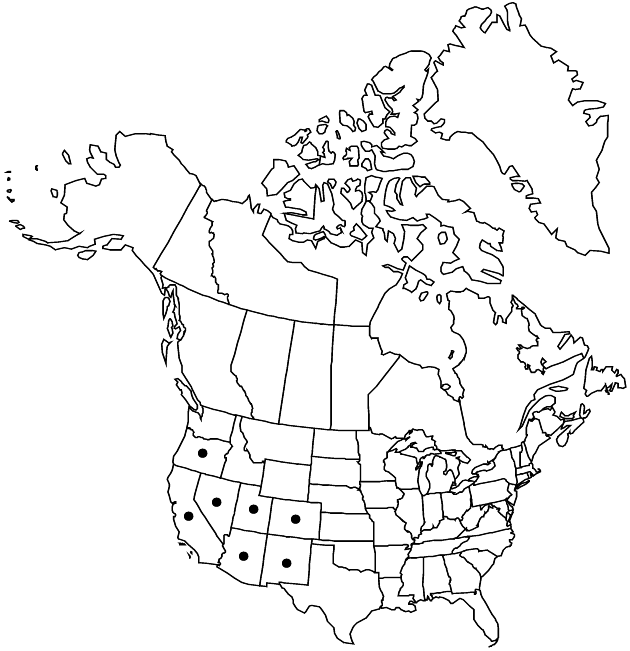Difference between revisions of "Erigeron aphanactis"
Fl. Francisc., 389. 1897.
FNA>Volume Importer |
FNA>Volume Importer |
||
| Line 24: | Line 24: | ||
|distribution=w United States. | |distribution=w United States. | ||
|discussion=<p>Varieties 2 (2 in the flora).</p><!-- | |discussion=<p>Varieties 2 (2 in the flora).</p><!-- | ||
| − | --><p>Erigeron aphanactis is distinguished from E. austiniae by its conspicuously puberulent (versus essentially glabrous) disc corollas and white (versus yellow) carpopodia; it also is similiar in habit and vestiture to E. concinnus, which has conspicuous white to pinkish rays.</p> | + | --><p><i>Erigeron aphanactis</i> is distinguished from E. austiniae by its conspicuously puberulent (versus essentially glabrous) disc corollas and white (versus yellow) carpopodia; it also is similiar in habit and vestiture to <i>E. concinnus</i>, which has conspicuous white to pinkish rays.</p> |
|tables= | |tables= | ||
|references= | |references= | ||
| Line 59: | Line 59: | ||
|publication year=1897 | |publication year=1897 | ||
|special status= | |special status= | ||
| − | |source xml=https://jpend@bitbucket.org/aafc-mbb/fna-data-curation.git/src/ | + | |source xml=https://jpend@bitbucket.org/aafc-mbb/fna-data-curation.git/src/8f726806613d60c220dc4493de13607dd3150896/coarse_grained_fna_xml/V19-20-21/V20_609.xml |
|tribe=Asteraceae tribe Astereae | |tribe=Asteraceae tribe Astereae | ||
|genus=Erigeron | |genus=Erigeron | ||
Revision as of 15:25, 18 September 2019
Perennials, 2–20(–30) cm; taprooted, caudices branched. Stems erect to slightly decumbent-ascending, canescent-hirsute, densely stipitate-glandular. Leaves basal (persistent) and cauline (petioles prominently ciliate, at least on proximal portions, hairs thick-based, spreading); basal blades linear-oblanceolate to spatulate, 20–80 × 2–7 mm, cauline gradually or abruptly reduced distally, sometimes bractlike (stems scapiform), margins entire, faces canescent-hirsute, densely stipitate-glandular (hairs finer). Heads (disciform) 1–4. Involucres 4–6 × 7–15 mm. Phyllaries in 2–3 series, coarsely hirsute, densely minutely glandular. Ray (pistillate) florets 30–45; corollas usually tubular, lacking laminae, or laminae shorter than involucres. Disc corollas 2.8–4.5 mm (throats white-indurate and inflated, conspicuously puberulent). Cypselae 1.5–1.8 mm, 2-nerved, faces sparsely strigose (carpopodia whitish); pappi: outer of scales or setae, inner of 7–20 bristles.
Distribution

w United States.
Discussion
Varieties 2 (2 in the flora).
Erigeron aphanactis is distinguished from E. austiniae by its conspicuously puberulent (versus essentially glabrous) disc corollas and white (versus yellow) carpopodia; it also is similiar in habit and vestiture to E. concinnus, which has conspicuous white to pinkish rays.
Selected References
None.
Key
| 1 | Stems leafy; heads usually 2–3; disc corolla lobes usually yellowish | Erigeron aphanactis var. aphanactis |
| 1 | Stems scapiform; heads 1; disc corolla lobes sometimes becoming reddish or purplish | Erigeron aphanactis var. congestus |